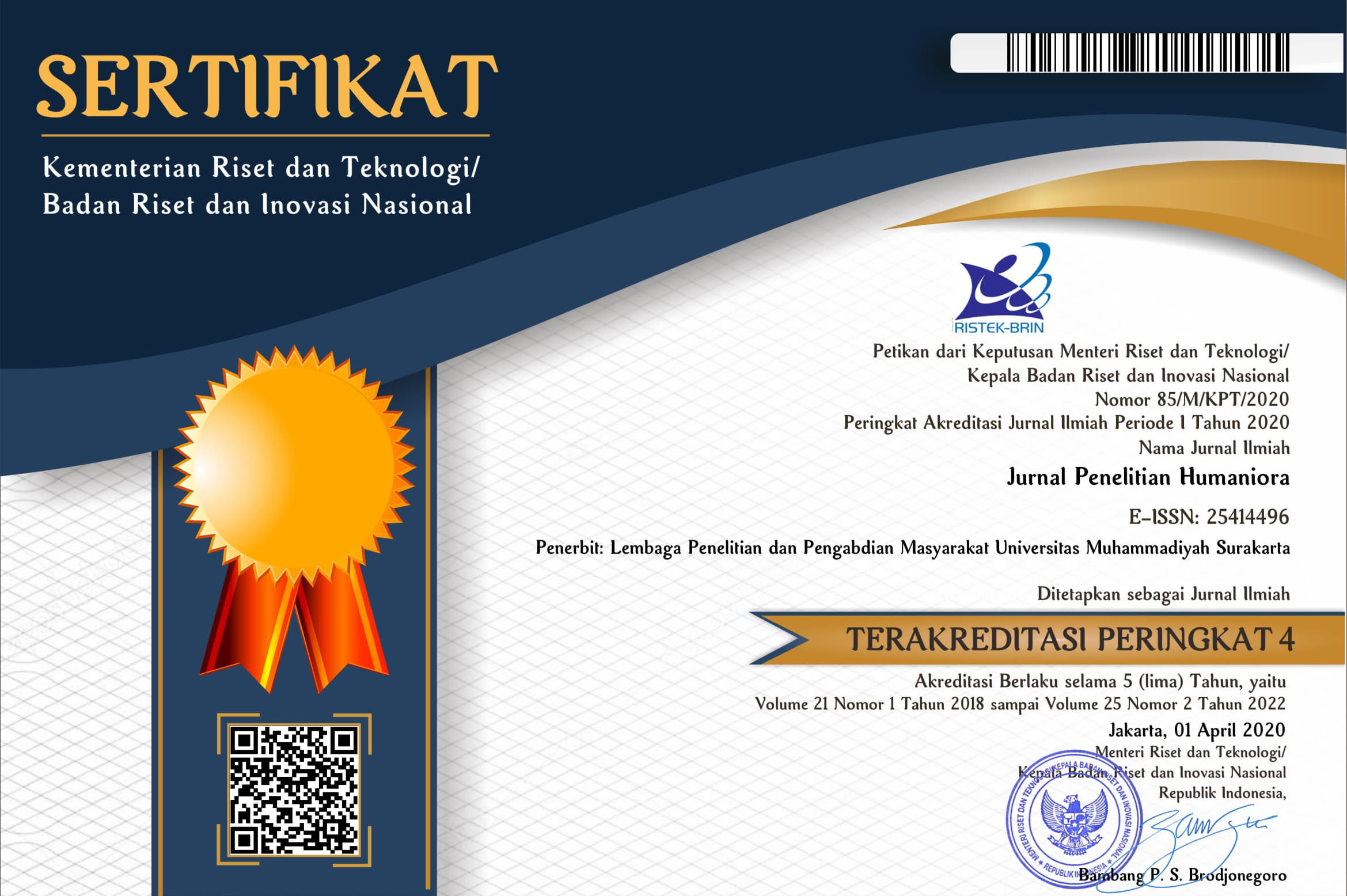PENGELOLAAN PEMBELAJARAN PENDIDIKAN ANAK USIA DINI (PAUD) DI KB “CERDAS” KECAMATAN SUKOREJO KABUPATEN KENDAL
Rosyid Ridho(1*), Markhamah Markhamah(2), Darsinah Darsinah(3)(1) Universitas Muhammadiyah Surakarta
(2) Universitas Muhammadiyah Surakarta
(3) Universitas Muhammadiyah Surakarta
(*) Corresponding Author
Abstract
The purpose of this study was to determine (1) Early Childhood Lesson Planning in KB Cerdas Sukorejo Kendal, (2) implementation of learning, (3) Assessment of learning. This research is qualitative. The research was carried out in KB Cerdas Sukorejo Kendal. The main subject of the study was the Chief Manager, teacher, and students. The methods of the data collection to make use of in-depth interviews, observation, and documentation. Analysis of the data to begin with : Data Collection, data reduction, data display, and conclusion. the validity of the data using the credibility, and triangulation. The results of this study are (1) Lesson planning in KB Cerdas Sukorejo have done by developing programs of activities for a year through the semester planning, weekly activities planning (RKM), and daily activities planning (RKH), taking into account the level of development, necessary, interests, and characteristics of the child, and also the aspects of development religious values and moral, cognitive, motor, language and social-emotional, (2) Implementation of Learning in KB Cerdas Sukorejo to begin a) with happy morning, b) activities of habituation, c) transitions, d) footing environment, e) footing before playing, f) footing while playing g) footing after playing h) introduction praying, and i) closing prayer. Learning was refer to the implementation of the principle of learning while playing with the approach of beyond center and circle time (BCCT), the method of question and answer, and role play by arrangement of conducive play house, to creates a comfortable condition to play, safe, clean, healthy and interest, the use of educational games was standards, as well as take advantage of the learning environment at the institution. (3) Assessment of learning is done by observation every times not only when the children play in the center, but it begin from the reception children, while teaching and Learning process until the study is finished through the performance of the child, the child’s assignment, with the development of indicators of the level of achievement which covers five aspects of the development of the students. Assessment techniques in KB Cerdas learning through observation, anecdotal and portfolio.
Keywords
Full Text:
PDFReferences
Depdiknas, 2009. Permendiknas nomor 58 tahun 2009. Jakarata.
Dinas Pendidikan Provinsi Jawa Tengah. 2012. Model Pembelajaran PAUD, Semarang
Dinas Pendidikan Provinsi Jawa Tengah. 2012. Pedoman Pengembangan Pengelolaan Kelompok Bermain. Semarang
Dinas Pendidikan Provinsi Jawa Tengah. 2012. Modul Pengembangan Kurikulum PAUD. Semarang
Dinas Pendidikan Provinsi Jawa Tengah. 2012. Pedoman Pengembangan Kurikulum dan Pembelajaran PAUD Holistik Integratif. Semarang
Dinas Pendidikan Provinsi Jawa Tengah. 2013. Pengembangan Pembelajaran (Kurikulum) PAUD. Semarang.
Galuh, dkk. 2013 Panduan Pengembangan Kurikulum PAUD, Solo : Solopos Ceria.
Mulyasa, 2012. Manajemen PAUD. Bandung: Remaja Rosdakarya.
Moleong, Lexy. 2012. Metodologi Penelitian Kualitatif. Bandung: Remaja Rosdakarya.
Rohidi, Tjejep. 1999. Analisis Data Kualitatif. Jakarta: UI Press.
Hadi. 2008. ”Konsep Bermain sambil Belajar dalam PAUD”. http://xpresiriau.com (diakses tanggal 9 Oktober 2012).
TIM. 2004. Manajemen Pendidikan; Pedoman bagi Kepala Sekolah dan Guru. Surakarta: Muhammadiyah University Press.
Algozzine, Gretes, dan Queen. 2007. “Beginning Teachers’ Perceptions of Their Induction Program Experiences”. International Journal of Academic Research Library Vol. 80, Iss. 3; pg. 137, 7 pgs.
Audra Parker, Stacey Neuharth-Pritchett. 2006. “Developmentally Appropriate Practice in Kindergarten: Factors Shaping Teacher.” Journal of Research in Childhood Education; Fall 2006; 21, 1; Academic Research Library pg. 65.
Dunn, Cheryl L., J. Owen Cherrington, Annita S. Hollander. 2005. Enterprise Information System, A Pattern-Bassed Approach. Edisi Ketiga, Newyork : Mc-Graw-Hill.
Logue, Mary E. 2007. “Early Childhood Learning Standards: Tools for Promoting Social and Academic Success in Kindergarten.” Children & Schools; Jan 2007; 29, 1; ProQuest Education Journals. pg. 35.
Departemen Pendidikan Republik Indonesia. 2013. Undang-undang Nomor 20 Tahun 2003 tentang Sistem Pendidikan Nasional.
Article Metrics
Abstract view(s): 3519 time(s)PDF: 15723 time(s)
Refbacks
- There are currently no refbacks.











